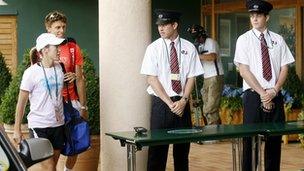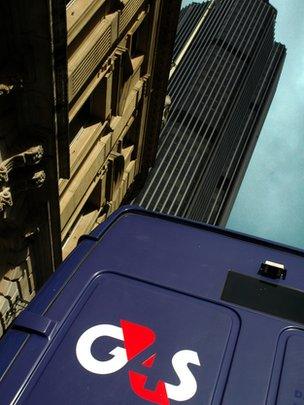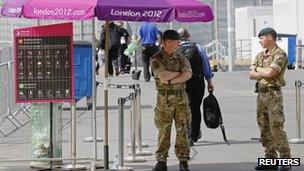What is G4S and how will Olympic problems affect it?
- Published

G4S are used to providing staff for high-profile sporting events such as Wimbledon
"Securing Your World" is G4S's maxim. But it looks like the world's largest security firm has failed to secure its own world, at least as far as London 2012 is concerned.
Just fifteen days before the start of the Olympic Games, it has had to admit that it cannot supply all of the 10,000 security staff to Olympic organiser Locog it is contracted to.
As a result, 3,500 soldiers will stand in for G4S, at a time when the British Army is undergoing large-scale redundancies.
Who is G4S?
G4S has 657,000 employees in over 125 countries and makes its money from companies and governments outsourcing "businesses processes" - placing security staff where there aren't enough police, for example, or prison officers where those are lacking.
Government contracts accounted for 27% of its £7.5bn turnover in 2011, and it had hoped to have a bumper 2012 as a result of its work on the Olympics.
"We protect rock stars and sports stars, people and property, including some of the world's most important buildings and events" is how it presents its business - security made sexy, almost.
But G4S has run into difficulty with high-profile contracts before.
Last October inmates in Birmingham Prison, under G4S's management since it became the first British prison to be transferred into private control, were locked in their cells for almost a day after a set of keys fitting every cell door went missing.
G4S runs seven prisons in England and Wales and is eyeing new business as police forces, under budgetary pressures, are looking to out source to companies like G4S.
Soldiering on

G4S works in 125 countries
G4S is contracted by London 2012 organisers Locog to supply 13,000 staff to the Olympics.
G4S is not saying why it cannot fulfil the contract. It simply issued a short statement saying that it has almost 4,000 people at work across 100 Olympic venues and another 9,000 going through the final stages of its "extensive" vetting, training and accreditation process.
Now 3,500 British soldiers are to be deployed at two weeks' notice to fulfil G4S's pledge to keep the games safe, and during the time many of them had planned to take their summer holidays.
Keith Vaz, Labour MP and chairman of the Commons' Home Affairs Select Committee said G4S had "let the country down and we have literally had to send in the troops".
The question remains as to whether, or to what extent, the security firm will lose out financially.
Home Secretary Theresa May told the Commons that there was a clause in Locog's contract with G4S that set out a penalty if they did not fulfil their agreed responsibilities, though she said that was a matter between G4S and Locog.
'Significant challenge'

Soldiers will be called in to cover for G4S's security staff at Olympic venues
G4S shares fell as much as 4% after news of its contract troubles emerged.
But Caroline De La Soeujeole, an analyst at Seymour Pierce who covers G4S, said she did not think G4S would suffer financially.
"The share price reaction is overblown as the Olympics contract is a relatively small part of G4S's revenues," she told BBC News. "I don't think profits at the year-end will be significantly affected by this news."
G4S says that it experienced delays in processing its Olympic security job applicants that have held many back from completing their final checks and starting work.
<itemMeta>news/uk-england-london-18767999</itemMeta> that many thousands of young unemployed people had completed the training but then had problems with incorrect employee system logins, or simply not heard from G4S about when they were supposed to start work.
At the time of writing, G4S's Olympics homepage still said that there were places waiting to be filled at the Olympics.
Another analyst, who wanted to remain anonymous, suggested the way G4S handled the contract was not unusual, but it should have started the process earlier.
"G4S has managed this too tightly [to the deadline]," he said.
"But the government knew that the company would not hire people months off from the Games, that it would ramp it up much closer to the time they were needed," the analyst told the BBC. "Any other business would do the same.
"The final part of the accreditation process is done by the government.
"One cannot start work until they have completed that. It's a bottleneck."
In March, the Public Accounts Committee said it was "particularly concerned" that Locog had asked G4S in December 2011 to supply twice the number of security staff it originally agreed to, trebling the cost of the contract from £86m to £284m.
It said that Locog and G4S faced a "significant challenge to recruit, train and coordinate all the security guards in time for the Games".
Margaret Hodge MP, chair of the Public Accounts Committee, said it was "staggering that the original estimates were so wrong".
- Published12 July 2012
- Published21 June 2012
- Published30 April 2012